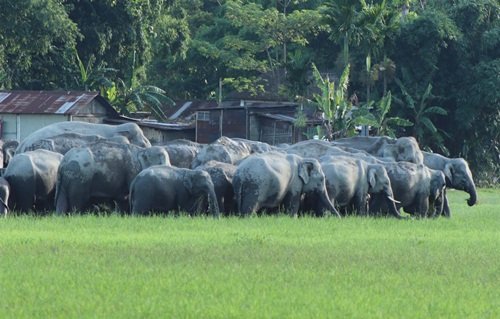IVRI to study fatal virus infecting elephants
Majuli
Bareilly (Utta (IANS) – The discovery of cases of elephant endotheliotropic herpesvirus (EEHV) in southern India has put the Indian Veterinary Research Institute (IVRI) in Bareilly on its toes.
The IVRI has launched a study to check if the virus is present among pachyderms, both in the wild and in captivity, in northern India.
The EEHV is a fatal haemorrhagic disease and is highly dangerous for elephant calves as they can die within 24 hours of getting infected. Adults are usually carriers of the disease.
According to experts, there are seven sub-types of EEHV and of these, four are commonly found among Asian elephants. However, out of these, only one strain of EEHV has been detected in India so far.
The virus is believed to be transmitted through trunk secretions. Some cases of EEHV have been confirmed in Kerala and Assam and it is suspected that the virus may be present among elephants in northern India.
IVRI Director R.K. Singh said, “We are doing research as it is an emerging disease. The institute has received samples of three sub-adult elephants from Odisha’s Nandankanan zoo that died of suspected EEHV.”
Scientists said the final report on these elephants will be prepared in a week.
Abhijeet Pawde, principal scientist and in-charge of Centre for Wildlife, IVRI, said, “EEHV damages blood vessels of calves and causes haemorrhage, leading to their death. However, adult elephants are mostly carriers of the virus. The disease can be fatal for an adult elephant infected with EEHV only if the pachyderm is under stress. In most cases, a calf catches the virus from adults after coming in close contact with them.” Scientists said the disease can be treated with anti-viral drugs, depending on severity of stress in an elephant.
Scientists will collect various samples of elephants in captivity, including those in zoos. Among the samples that will be collected are water in which the trunk has been washed, blood, eye swab and rectal swab.
Forest departments across the country have been sending blood samples to the IVRI following elephant deaths.
Scientists here have now asked them to send internal organs, including heart, lung and liver, along with water in which the trunk has been washed, to study if the dead jumbo was infected with EEHV.
The Dudhwa National Park, Corbett National Park and Rajaji National Park have a high population of elephants. Besides, herds from Nepal regularly move to forests of Uttar Pradesh and Uttarakhand and they may be carrying the virus.
–IANS
amita/rtp
Disclaimer: Validity of the above story is for 7 Days from original date of publishing. Source: AFP.


